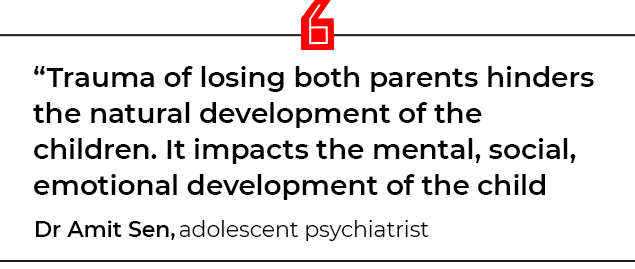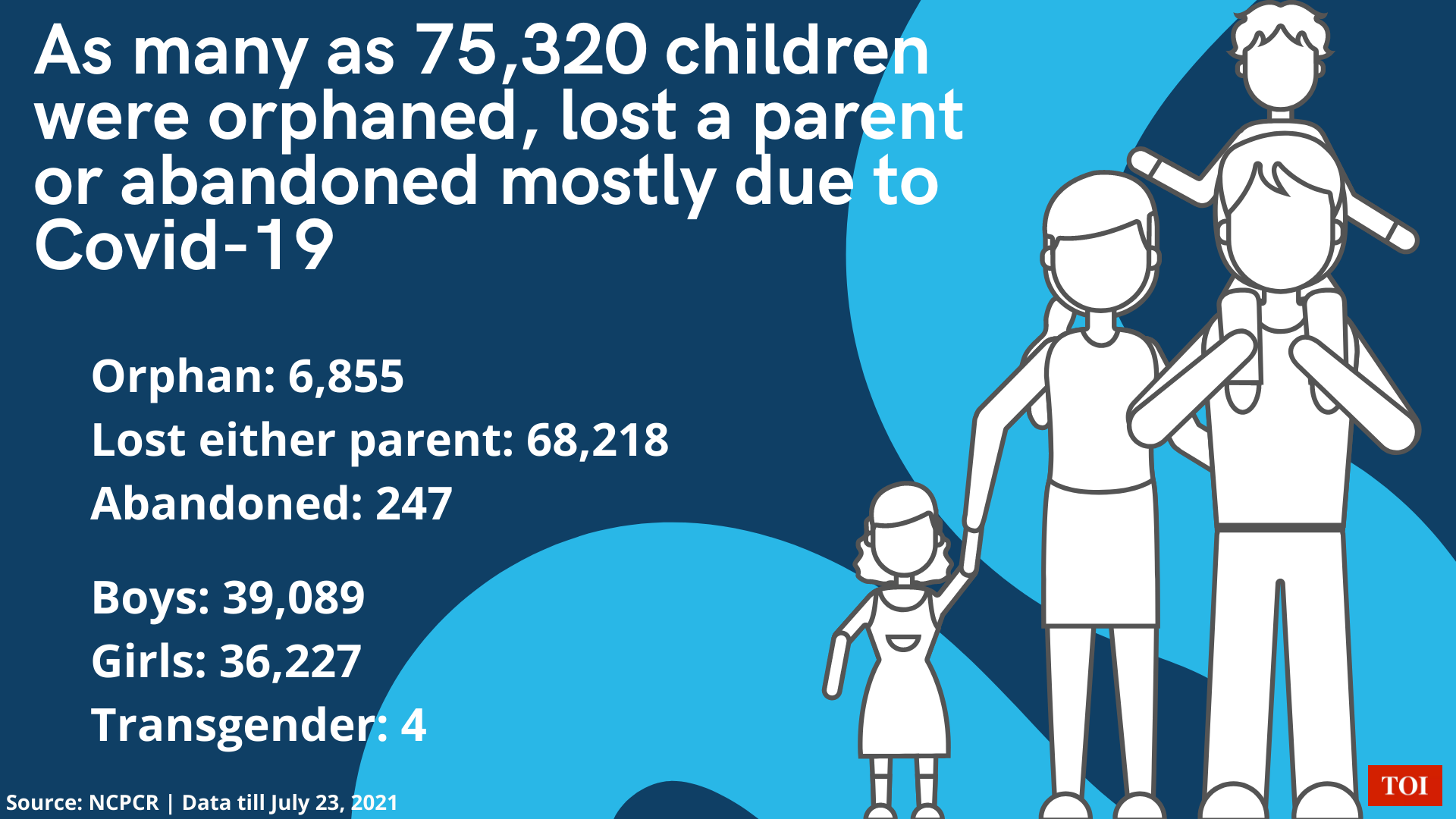Take Radhi for example. A six-year-old girl was found sitting next to her mother’s dead body at a traffic signal on a busy road in Haryana’s Faridabad city. Her father had died of Kovid-19 a few days back and now the disease has caught her mother too.
Or take the example of a class 11th Lucknow girl who lost both her parents in a matter of days.
in a recent incident Maharashtra, Four siblings aged 10-16 years lost both their parents. Two of them also required special attention as they were physically disabled.
Track back to Noida where Fatima (10) and her siblings – Nabina (8), Asif (5) and Youth (3) – Lost his mother to covid in May this year. The children now live in a kutcha shelter in a slum in Noida.
lost childhood
The National Commission for Protection of Child Rights (NCPCR) in a recent report Supreme court The U.S. has said that 6,855 children were orphaned due to the pandemic, 274 were abandoned and 68,218 lost their parents between April 1, 2020, and July 23, 2021.
The NCPCR in its report said that the number of children affected is 7,999 between 0-3 years of age, 13,254 between 4-7 years group and 11,799 between 14-15 years. It also said that the number of affected children between 16 and 18 years is 12,382.
However, child rights activists believe the number is likely to be higher.
These orphans face not only the emotional trauma of losing both parents but also physical dangers.
Violence. Child labour. Smuggling. child marriage. Sexual Exploitation. Orphaned children are put at extreme risk of neglect and exploitation.
“These children may be forced into child labor to survive or they may become victims of traffickers, drug peddlers, pedophiles or begging mafia,” says Sumant Kari, Secretary General, SOS Children’s Villages of India.
Recently, around 30 children were rescued. They were being taken from Bihar to Jaipur to work in bangle making units. The age of the children was between 10-16 years.
At the grassroots level, there is no child protection committee or system, says Roop Sen, an activist and founding member of Sanjog, a Kolkata-based non-profit. According to him village or district child protection societies are non-functional.

“Recently there were advertisements on social media for adopting children. It could be a trafficking operation and the anti-trafficking units should respond. But our systems failed,” he says.
What is worrying child workers, apart from trafficking and related crimes, is the psychological scars left behind.
orphans and mental health
“This [trauma of losing both parents] It hinders the natural development of children. It affects the mental, social and emotional development of the child. Children also go through depression and anxiety,” says Delhi-based child and adolescent psychiatrist, Dr Amit Sen.
Dr Sen says that children who need special care go through a deep trauma, as they have lost their main caregivers. “The impact on these children is devastating,” he says.

Dr Sen cites the example of a 14-year-old child who lost his parents and another was in an intensive care unit. The child had to stay in the ICU and the experience traumatized her. “The emotional scar can be a lifetime,” says Dr. Sen.
Delhi-based psychologist Dr Nisha Khanna acknowledges the fact that orphans go through intense emotional trauma and abandonment.
“It is very painful for them because they are not mentally prepared for this kind of loss. Even as adults we go through emotional upheaval over this kind of loss, you can imagine. How much this condition will affect children,” she says.
Are we failing our children?
Counselors and psychologists believe that such children need counseling with physical, emotional and mental health issues.
However, when it comes to the grassroots level, child workers are concerned about the acute shortage of professionals.
“There are not many trained counselors or psychologists in India. Also the delivery of counseling is also not good. The kind of emotional support these children need is not available.” Suresh Kumar, executive director of straight center, a non-profit organization in Bihar working to rescue and rehabilitate trafficked child workers.

a little help
The Supreme Court on May 28 took cognizance of children who have become orphans due to the COVID-19 pandemic and directed the states to provide them immediate relief.
Several states have announced relief packages and compensation for orphans. But are these compensations enough to mitigate the pandemic’s impact on children’s lives? Experts don’t think so.
Giving the example of Bihar, Kumar of Center Direct says that monthly relief of Rs 1500 is not enough for living. “There is also a possibility that the money may not reach these children. We don’t need traditional methods of supporting children who have failed,” he says.
According to him, the benefits of many social welfare schemes never reach the intended beneficiaries. Either because they are unaware of their qualifications or cannot manage the complex procedures and documents required to get help.
For most of us, the pandemic has changed the way we live. But for Covid orphans it is much more than this. It is an existential crisis for these children.
*Children’s names have been changed for anonymity
.